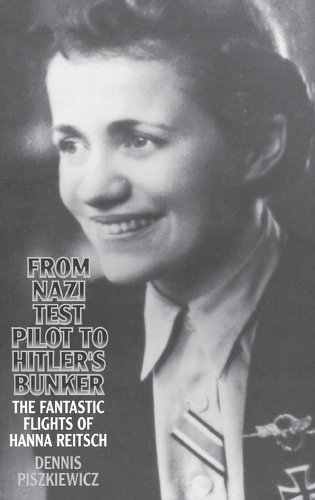
From Nazi Test Pilot to Hitler's Bunker: The Fantastic Flights of Hanna Reitsch
(Hardback)
Publishing Details
From Nazi Test Pilot to Hitler's Bunker: The Fantastic Flights of Hanna Reitsch
By (Author) Dennis Piszkiewicz
Bloomsbury Publishing PLC
Praeger Publishers Inc
25th November 1997
United States
Classifications
Tertiary Education
Non Fiction
Biography: historical, political and military
Aerospace and aviation technology
Gender studies: women and girls
Far-right political ideologies and movements
629.13092
Physical Properties
Hardback
168
Width 156mm, Height 235mm
454g
Description
Hanna Reitsch was a women who excelled as a test pilot. She succeeded in an environment that was extremely repressive to women - Germany before and during World War II. Hanna Reitsch's story is that of one of a handful of women who achieved personal success in male-dominated Nazi Germany. Hers is the story of a woman who escaped the culturally defined role of wife and mother to live her passion for flying. Reitsch began her career flying gliders, setting both distance and endurance records in the 1930s. As the war approached she became a test pilot for new and dangerous aircraft for the Luftwaffe. The aircraft she flew included a large number of gliders and military aircraft, including Focke-Achgelis FW 61 Hubschrauber (the first practical helicopter), the jet-powered piloted version of the V-1 buzz bomb, and the rocket-powered Messerschmitt 163. Her achievements as a pilot and her prowess as a test pilot made her a celebrity in Nazi Germany. She was decorated with the Iron Cross and was seen as a protegee of Hitler. In that role - as a friend of the Fuehrer - she became a witness to the fall of the Third Reich. In the final days of World War II she flew with her friend and lover, Luftwaffe General Robert Ritter von Greim - to join Hitler in his bunker. Minutes before Hitler was to marry Eva Braun, Hanna and von Greim - on Hitler's orders - flew from Berlin to Rechlin in a desperate attempt to rally the Luftwaffe and save the Reich. Hanna Reitsch was interviewed as a potential witness for the Nuremberg War Crimes Trials. Her interviewer was to state that "Her (Hanna's) account of the flight into Berlin to report to Hitler and of her stay in the Fuehrer's bunker is probably as accurate a one as will be obtained of those last days". It has remained so for half a century. This book also recounts an encounter in a cemetery in Kitzbuehel, Austria, in June of 1945, between Leni Riefenstahl, the filmmaker, perhaps the only other woman to be so successful in the Third Reich, and Hanna Reitsch. During this chance encounter, Hanna shows the letters of Josef and Magda Goebbels to Riefenstahl and the reader shares their shocking contents. Hanna Reitsch found in the Nazi establishment opportunities and rewards for her achievements. Yet, her story of success ultimately led to defeat and misery.
Reviews
"Piszkiewicz presents the singular career of German test pilot Hanna Reitsch.... In spite of family opposition and the social climate, she pursued her love [of flying] and at one time held, unofficially, most of the glider endurance, range, and altitude records. Shifting to powered aircraft, she became one of the best-known women of the Third Reich... Her ability was outstanding, her political judgement less so, though her cultivation of top-ranking Nazis seems to have been done as much to secure mentors as to support Nazi ideology. Proof that historically 'lost' women come in all shapes, sizes, and political colorations, this biography is a worthwhile addition to the literature of aviation."-Booklist
'Stratosphere' was the nickname her classmates in flying school gave to Hanna Reitsch for her daring and often reckless exploits--caught up in a storm, she flew a glider higher than that plane had ever been flown before. In this fast-paced biography, Piszkiewicz charts the career of the diminutive (barely five feet tall) pilot who abandoned her medical studies in 1934 to concentrate on training as a pilot. Reitsch rose quickly to become a renowned test pilot and came to the attention of Hitler himself. One of the most dramatic moments in the book occurs when the outspoken Reitsch, as a meeting in Berchtesgaden, openly contradicts the Fuhrer.-Publishers Weekly
Piszkiewicz presents the singular career of German test pilot Hanna Reitsch.... In spite of family opposition and the social climate, she pursued her love [of flying] and at one time held, unofficially, most of the glider endurance, range, and altitude records. Shifting to powered aircraft, she became one of the best-known women of the Third Reich... Her ability was outstanding, her political judgement less so, though her cultivation of top-ranking Nazis seems to have been done as much to secure mentors as to support Nazi ideology. Proof that historically 'lost' women come in all shapes, sizes, and political colorations, this biography is a worthwhile addition to the literature of aviation.-Booklist
The biography of this remarkable woman makes fascinating reading.-American Aviation Historical Society Newsletter
"'Stratosphere' was the nickname her classmates in flying school gave to Hanna Reitsch for her daring and often reckless exploits--caught up in a storm, she flew a glider higher than that plane had ever been flown before. In this fast-paced biography, Piszkiewicz charts the career of the diminutive (barely five feet tall) pilot who abandoned her medical studies in 1934 to concentrate on training as a pilot. Reitsch rose quickly to become a renowned test pilot and came to the attention of Hitler himself. One of the most dramatic moments in the book occurs when the outspoken Reitsch, as a meeting in Berchtesgaden, openly contradicts the Fuhrer."-Publishers Weekly
"The biography of this remarkable woman makes fascinating reading."-American Aviation Historical Society Newsletter
Author Bio
DENNIS PISZKIEWICZ was educated as a scientist and became interested in Hanna Reitsch while researching The Nazi Rocketeers (Praeger, 1995).
